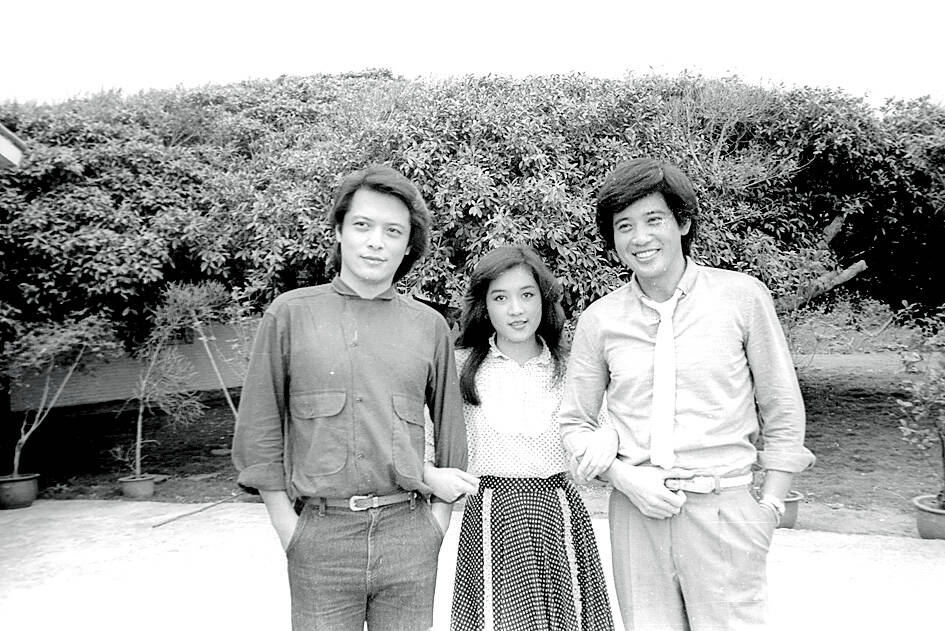Taiwanese pop icon Liu Wen Zheng (劉文正), who captivated the Mandarin-speaking world in the 1970s and 1980s, died in the US of a heart attack in November last year, his agent Hsia Yu-shun (夏玉順) confirmed to local Chinese-language media yesterday.
“A star has fallen and its legend will live on forever,” Hsia was quoted as saying.
Some local reports said that Liu died on the eve of his birthday, making him 69 at the time of his death.

Photo: CNA
Liu, who was born in Taipei on Nov. 12, 1952, rose to fame in 1975 with the release of his first album The Promise (諾言) and a starring role in the romantic film The Story of Four Girls (門裡門外), released nationally and in Hong Kong.
That same year, Liu took over the variety show Jin Xiu Nian Hua (錦繡年華) on Taiwan Television, launching a career as a leading entertainer in the age of state-run cable channels.
After that, Liu became the host of Liu Wen Zheng Shi Jian (劉文正時間), named after and tailored for him on China Television, which at its height reached a rating share of 82 percent, the highest for a Taiwanese show at that time.

Photo: CAN
In 1981, he performed and produced Fei Ying (飛鷹), which was the first Chinese-language music video and a commercial success.
Throughout his career, Liu acted in more than 20 romance films, and won Golden Bell awards for best leading actor in a singing role in 1980, 1982 and 1983. He also received awards for best Mandarin performance in Singapore and Malaysia.
Liu ended his contract with Hong Kong’s PolyGram Records and moved to the US in 1984, marking his retirement from singing.
He returned to Taiwan two years later and established Fei Ying Records, which represented some of the biggest talents in the nation’s music industry including Fang Wen-lin (方文琳), Annie Yi (伊能靜) and Donna Chiu (裘海正).
In 1991, Liu closed the label and returned to the US, refusing interviews, public appearances and a rumored movie deal worth close to NT$100 million (US$3.3 million).

Chinese Nationalist Party (KMT) Chairman Eric Chu (朱立倫), spokeswoman Yang Chih-yu (楊智伃) and Legislator Hsieh Lung-chieh (謝龍介) would be summoned by police for questioning for leading an illegal assembly on Thursday evening last week, Minister of the Interior Liu Shyh-fang (劉世芳) said today. The three KMT officials led an assembly outside the Taipei City Prosecutors’ Office, a restricted area where public assembly is not allowed, protesting the questioning of several KMT staff and searches of KMT headquarters and offices in a recall petition forgery case. Chu, Yang and Hsieh are all suspected of contravening the Assembly and Parade Act (集會遊行法) by holding

PRAISE: Japanese visitor Takashi Kubota said the Taiwanese temple architecture images showcased in the AI Art Gallery were the most impressive displays he saw Taiwan does not have an official pavilion at the World Expo in Osaka, Japan, because of its diplomatic predicament, but the government-backed Tech World pavilion is drawing interest with its unique recreations of works by Taiwanese artists. The pavilion features an artificial intelligence (AI)-based art gallery showcasing works of famous Taiwanese artists from the Japanese colonial period using innovative technologies. Among its main simulated displays are Eastern gouache paintings by Chen Chin (陳進), Lin Yu-shan (林玉山) and Kuo Hsueh-hu (郭雪湖), who were the three young Taiwanese painters selected for the East Asian Painting exhibition in 1927. Gouache is a water-based

Taiwan would welcome the return of Honduras as a diplomatic ally if its next president decides to make such a move, Minister of Foreign Affairs Lin Chia-lung (林佳龍) said yesterday. “Of course, we would welcome Honduras if they want to restore diplomatic ties with Taiwan after their elections,” Lin said at a meeting of the legislature’s Foreign Affairs and National Defense Committee, when asked to comment on statements made by two of the three Honduran presidential candidates during the presidential campaign in the Central American country. Taiwan is paying close attention to the region as a whole in the wake of a

OFF-TARGET: More than 30,000 participants were expected to take part in the Games next month, but only 6,550 foreign and 19,400 Taiwanese athletes have registered Taipei city councilors yesterday blasted the organizers of next month’s World Masters Games over sudden timetable and venue changes, which they said have caused thousands of participants to back out of the international sporting event, among other organizational issues. They also cited visa delays and political interference by China as reasons many foreign athletes are requesting refunds for the event, to be held from May 17 to 30. Jointly organized by the Taipei and New Taipei City governments, the games have been rocked by numerous controversies since preparations began in 2020. Taipei City Councilor Lin Yen-feng (林延鳳) said yesterday that new measures by